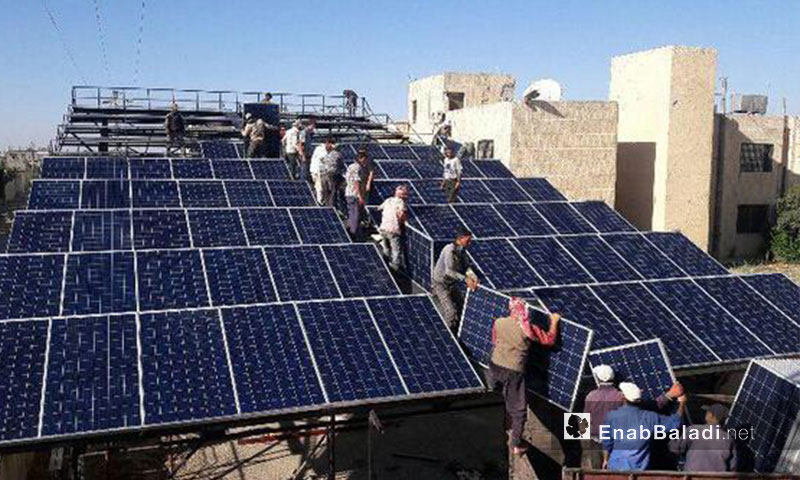Enab Baladi
Solar energy has been launched at the Nawaa Hospital in Daraa countryside, after the local council installed hundreds of panels and batteries in a project which was described by the residents of the region as “the biggest” in the south in terms of cost and equipment.
The hospital is the most prominent in the western region of the province of Daraa, which is under the control of the opposition, and the project management said that it was a transition from generating electricity using diesel, to greener and more eco-friendly electricalpower.
The local council benefited from the ceasefire agreement and the reduced frequency of fighting to manage service projects, most notably the improvement of the health sector, after years of damage to hospitals and medical units, the largest of which was the launch of solar energy in the Nawa Hospital on Saturday (September 16th).
The cost exceeded 400 thousand dollars
The spokesman of the project Adnan al-Jabbawi told Enab Baladi that the hospital was dependent on generators, with a monthly consumption of about four thousand litres of fuel per month, which necessitated thinking of a more viable alternative for operating the hospital.
“Syria Basic Services SES 2” project supports about 90% of Daraa projects, has an office within the province.
The area suffered from the difficulty of the diesel fuel’s availability in the region, after the cutting of supply routes coming from oil wells in eastern Syria. This prompted the local council to oversee the implementation of the project, which was funded by “Syria for basic services SES 2” project, at a cost of $ 400 thousand (more than 200 Million Syrian Liras), according to al-Jabbawi.
Al-Jabbawi explained that 474 solar panels were installed in the hospital, operated by 492 batteries. He pointed out that the project provided 40 jobs opportunities, for workers and engineers, within 40 days of its start.
Four staff members work to guard and protect the hospital which is fully functioning on the solar panels, except for the CT scanner, which needs electric power that the solar panels cannot generate.
Fear for the panels and residents call to provide “the most important”
The project’s exposure to sabotage or destruction remains a main concern for the hospital administration. According to al-Jabbawi’s vision, “a setback in the current truce could make the project a target of the Assad forces.” “We have taken measures to prevent sabotage through guard, but we cannot do anything in front of the bombing.”
What really matters to the residents is that the hospital is ready to provide assistance at any time, according to Ahmad al-Jahmani, a resident of Nawa. He said to Enab Baladi “It’s good to know that the project helps the hospital to overcome problems.We do not care if it works on solar energy or electrical generators”.
According to Ahmed, the hospitals in Daraa suffer from a lack of many necessities. He said “They do not have the ability to deal with serious cases that require intensive care, and the wounded and injured have to wait hours on the border to enter Jordan or Israel. Some people have to take risks to go to areas of regime control. ”
“All our hospitals to date have no magnetic resonance device and eye surgery equipment,” the young man concluded, calling on those wishing to develop it to “start with the medically most important devices.”
The project of the hospital working on solar energy, coincides with another project of operating the furnace within the city of Nawa.
Similarly, the local council in Bosra seeks to operate the city hospital in the same way, along with other projects to operate the water wells in Dar’a al-Balad, in the hope that the fights will not stop the work on these projects again.

